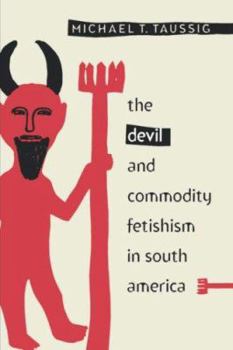The Devil and Commodity Fetishism in South America
Select Format
Select Condition 
Book Overview
Michael Taussig explores the social significance of the devil in the folklore of contemporary plantation workers and miners in South America. Grounding his analysis in Marxist theory, Taussig finds that the fetishization of evil, in the image of the devil, is an image which mediates the conflict between precapitalist and capitalist modes of objectifying the human condition.
Format:Paperback
Language:English
ISBN:0807841064
ISBN13:9780807841068
Release Date:January 1983
Publisher:University of North Carolina Press
Length:277 Pages
Weight:0.93 lbs.
Dimensions:0.8" x 6.1" x 9.3"
Customer Reviews
3 ratings
A misunderstood book
Published by Thriftbooks.com User , 22 years ago
First, let me state that I totally disagree with the previous bad review of this book. The book is not hard to read by any means, but to fully understand and comprehend this book you need a solid background in Marxist theory. I found the book to be very enjoyable and enlightening. The first half the the book, based on Taussig's on research on devil pacts and baptised banknotes in Columbia's Cauca Valley, is very good. The second half of the book, based mainly on the research of June Nash on the "devil-worship" of Bolivian miners, does not flow as well. It seems to be a bit jumbled, but nonetheless has some interesting ideas and is worth reading. I recommend this book to anyone interested in Marxism and religion or the anthropology of religion.
An excellent and creative application of theory
Published by Thriftbooks.com User , 22 years ago
This is doubtless Taussig's clearest and most straightforward book -- if you think the text here is convoluted, try "The Nervous System" or "The Magic of the State" on for size. Both of these works, as with all of Taussig, are outstanding in their own way, but for the beginning reader in anthropology, this is certainly where to start if you want to explore that realm of anthropological wisdom known as the World of Uncle Mike.The issue is very simple. Capitalism is deconstructed as a form of Western European "local knowledge" by throwing it into relief with indigenous notions regarding the flows of wealth, labor, and ultimately power. Within the local meaning system, the metaphysical capitalist ideal of accumulation is likened to a demonic force; correspondingly, the wealthy persons in the colony (from whom the poor farmer must borrow money or otherwise "strike a deal" in order to survive) are likened to the Devil. The whole thing really makes a heck of a lot of sense, whatever your precise stance on Marxism.Another interesting aspect of the book is the way in which Taussig explains what, to the modern individual, is the ludicrous social solidarity found among miners (and by extension, other groups who engage in extremely dangerous occupations). While we modern readers wonder why miners and others love their jobs and co-workers so much, Uncle Mike explains that solidarity is the only strategy of overcoming the darkness and peril of such types of work. Communitas among the workers becomes a moral issue -- this idea resonates throughout the book.All in all, an intelligent person looking for a clear and insightful read in economics and ethnology will find themselves grinning from ear to ear when they read this book. Unlike Taussig's later works, you don't have to have read everything from von Humboldt to Benjamin to Timerman to appreciate the thesis, argument, and flashes of brilliance sprinkled throughout.
Capitalist deconstruction anyone?
Published by Thriftbooks.com User , 24 years ago
Don't be put off by the title. This work is a rarity--a complex academic deconstruction of the impact of capitalism on so-called primitive cultures that is actually an entertaining read for non-academics. Taussig visits with two indigenous groups of Latin America as they try to make spiritual sense out of the explosive cultural and personal adaptation required by the abrupt institution of capitalism and the wage economy into their previously use-value, communitarian based economic systems. These communities begin to describe their experience through telling demonic metaphors as they struggle to explain the anti-communal values of the capitalist wage system and its impact on communal and familial harmony. Taussig uses the experience of the newly initiated into capitalism to remind members of the "developed" world a little of how much they have culturally sacrificed and forgotten as they've struggled to normalize capitalist modes of production and exchange. Taussig manages to uncover the deeper truths behind some of the cultural expressions of ambivalence toward money and the mode of life and production most of us accept unquestioningly. If you've found yourself muttering that money is indeed the root of all evil, you may be echoing a pre-capitalist European sentiment eventually quashed by the industrial revolution but still very real to the experience of the indigenous people Taussig investigates.






